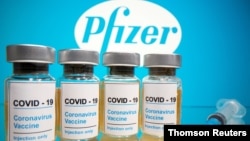ຂ່າວທີ່ວ່າຢາວັກຊີນຕ້ານໄວຣັສໂຄໂຣນາອາດຈະມີຢູ່ໃນຂອບເຂດທີ່ພໍມອງເຫັນໄດ້ກໍາລັງເຮັດໃຫ້ມີຄວາມຫວັງເພີ້ມຂຶ້ນວ່າການລະບາດຢ່າງໜັກຂອງໂຄວິດ-19 ອາດຈະສິ້ນສຸດລົງໄດ້.
ບໍລິສັດຜະລິດຢາຟາຍເຊີ (Pfizer) ແລະບໍລິສັດໄບໂອເອນເທັກ (BioNTech) ໄດ້ປະກາດໃນວັນຈັນຜ່ານມາວ່າ ຢາວັກຊີນຂອງຕົນ ມີປະສິດທິພາບຫຼາຍກວ່າ 90% ໃນການເບິ່ງຂໍ້ມູນການທົດລອງທາງຄລີນິກ ຂອງຕົນໃນຊ່ວງຕົ້ນໆ.
ຂ່າວນີ້ແມ່ນສາເຫດທີ່ເຮັດໃຫ້ເກີດມີຄວາມຫວັງໃນແງ່ດີ, ແຕ່ຜູ້ຊ່ຽວຊານກ່າວວ່າຢ່າຟ້າວປະຖິ້ມໜ້າກາກຂອງທ່ານເທື່ອ.
ພວກນັກຊ່ຽວຊານເຕືອນວ່າ ບັນດານັກວິທະຍາສາດຢູ່ພາຍນອກ ຍັງບໍ່ໄດ້ທົບທວນຂໍ້ມູນດັ່ງກ່າວເທື່ອ. ເຖິງແມ່ນວ່າມັນຈະເປັນດັ່ງວ່າ, ຢາວັກຊີນອາດຈະບໍ່ໃຊ້ໄດ້ຜົນເຊັ່ນດຽວກັນ ຢູ່ໃນໂລກຕົວຈິງຄືກັນກັບຕອນທີ່ມັນເບິ່ງຄືວ່າມັນເປັນແນວນັ້ນ ເວລາຢູ່ໃນການທົດລອງທາງຄລີນິກທີ່ມີການຄວບຄຸມ.
ແຕ່ໂດຍລວມແລ້ວ, ພວກເຂົາເຈົ້າເວົ້າວ່າ ຜົນໄດ້ຮັບແມ່ນເຮັດໃຫ້ມີກຳລັງໃຈຫຼາຍ. ທ່ານແອນໂທນີ ຟາວຈີ ຜູ້ອຳນວຍການສະຖາບັນໂຣກພູມແພ້ແລະພະ ຍາດຕິດແປດໄດ້ກ່າວວ່າ ການຄົ້ນພົບວ່າຢາວັກຊີນນີ້ມີປະສິດທິພາບສູງກວ່າ 90 ເປີເຊັນແມ່ນ "ວິເສດຫລາຍ."
ທ່ານກ່າວຕື່ມວ່າ ທ່ານເວົ້າວ່າ “ຫຼາຍໆຄົນບໍ່ຄາດຄິດເລີຍວ່າ ມັນຈະສູງເຖິງຂະໜາດນັ້ນ.”
ບໍລິສັດຜະລິດຢາ ຟາຍເຊີ (Pfizer) ຍັງບໍ່ໄດ້ເຜີຍແຜ່ຂໍ້ມູນກ່ຽວກັບຄວາມປອດໄພເທື່ອ. ບໍລິສັດນີ້ກ່າວວ່າ ອັນນັ້ນຈະມາ ໃນທ້າຍເດືອນພະຈິກ, ສອງເດືອນພາຍຫຼັງທີ່ຄົນປ່ວຍສ່ວນໃຫຍ່ໄດ້ຮັບຢາຄັ້ງທີສອງແລ້ວ.
ໃນການທົດລອງເບື້ອງຕົ້ນ, ຜົນຂ້າງຄຽງທີ່ມັກພົບເລື້ອຍໆ ລວມມີອາການເຈັບແຂນ, ຄີງຮ້ອນ, ໜາວສັ່ນແລະເມື່ອຍ, ແຕ່ບໍ່ມີຫຍັງຮ້າຍແຮງ.
ອ່ານຂ່າວນີ້ເພີ້ມເປັນພາສາອັງກິດຢູ່ຂ້າງລຸ່ມນີ້
The news that a vaccine against the coronavirus may be on the horizon is raising hopes that the end of the COVID-19 pandemic may be in sight.
Pfizer and partner BioNTech announced Monday that its vaccine was more than 90% effective in an early look at its clinical trial data. [[https://www.pfizer.com/news/press-release/press-release-detail/pfizer-and-biontech-announce-vaccine-candidate-against ]]
The news is cause for optimism, but experts say don't throw away your mask just yet.
Promising, but preliminary
Experts caution that outside scientists have not reviewed the data. Even if it holds up, the vaccine may not perform as well in the real world as it seems to have in a controlled clinical trial.
But overall, they say the results are very encouraging. National Institute of Allergy and Infectious Disease Director Anthony Fauci said the finding that the vaccine is more than 90% effective is "just extraordinary."
"Not very many people expected it would be as high as that," he added.
Questions remain
Pfizer has not yet released safety data. The company says that will come in late November, two months after most patients have received their second dose.
In early testing, common side effects included sore arms, fever, chills and fatigue, but nothing severe.
Two other companies' vaccine trials had to pause while possible safety issues were cleared, but Pfizer's has run smoothly so far.
While the preliminary results are good news, several key questions remain unanswered, including:
- How long does protection last?
- Does the vaccine prevent severe disease and complications?
- Can vaccinated people still carry and spread the virus?
- How well does the vaccine work in older adults? Elderly people are at higher risk from COVID-19, but their immune systems often do not respond as well to vaccines
- Does it work better or worse in different ethnic groups? That information may come later. Pfizer says 42% of the trial participants are from racially diverse backgrounds
Waiting period
Pfizer is expected to ask the U.S. Food and Drug Administration (FDA) for emergency-use authorization in late November once the initial safety data comes in. The FDA will take a few weeks to review the data.
Fauci said the first recipients may get the vaccine "very likely before the end of this year."
But there will not be enough for everyone. Pfizer said it expects to produce up to 50 million doses this year, enough vaccine for up to 25 million people. The company committed 10 million doses to Britain.
In the United States, priority likely will go to front-line health care workers, first responders and the most vulnerable. Experts do not expect widespread distribution before the middle of next year.
Distributing a vaccine to the entire world never was going to be easy. But this type of vaccine adds an extra layer of difficulty.
The shots need to be stored at minus 70 Celsius, or minus 94 Fahrenheit, much colder than normal freezers. Pfizer has developed shipping containers of dry ice to keep the vaccine cold during transport. But delivering to remote areas and places without special freezers will pose problems.
First vaccine of its kind
Pfizer's vaccine uses a new approach to prime the immune system to fight the coronavirus.
Most vaccines inject a weakened or killed version of the virus, or a piece of it, which prepares the immune system to target the real virus.
Pfizer's shot, however, delivers just the genetic instructions for a piece of the coronavirus. When injected into patients' arms, their muscle cells produce the virus piece themselves.
Pfizer acquired the technology from its German partner, BioNTech. U.S. biotech company Moderna has a similar vaccine nearing the end of its clinical trials.
The coronavirus vaccine is the first test of this type of shot, but scientists are hopeful about its prospects for many other illnesses. Genetic code is much easier to produce than whole viruses or virus pieces, which must be grown in finicky living systems. And the code can be changed easily if the virus mutates.
More vaccines are coming
The world cannot rely on Pfizer alone to vaccinate the entire population, experts note. The company expects to produce up to 1.3 billion doses next year, but that still is far short of global demand.
Other companies are close behind, however.
Clinical trial results from Moderna are expected later this month. AstraZeneca and Johnson & Johnson said they will have data before the end of the year. Moderna has one trial wrapping up in Britain in early 2021 and another starting in the United States late this year.
Pfizer's results are encouraging for these other vaccines, experts note. All of them target the spike protein the virus uses to enter cells and cause infection.
Chinese companies CanSino Biologics, Sinopharm and Sinovac Biotech have vaccines in late-stage trials in several countries. The Chinese government has approved CanSino's and Sinovac's for limited use in China, and the United Arab Emirates have approved Sinopharm's vaccine for health care workers.
India's Bharat Biotech entered its vaccine in late-stage trials in October. Russia's Ministry of Health also has a candidate in testing.
The World Health Organization tallies 47 vaccine candidates in some stage of human testing and 155 more in lab evaluations. [[https://www.who.int/publications/m/item/draft-landscape-of-covid-19-candidate-vaccines





